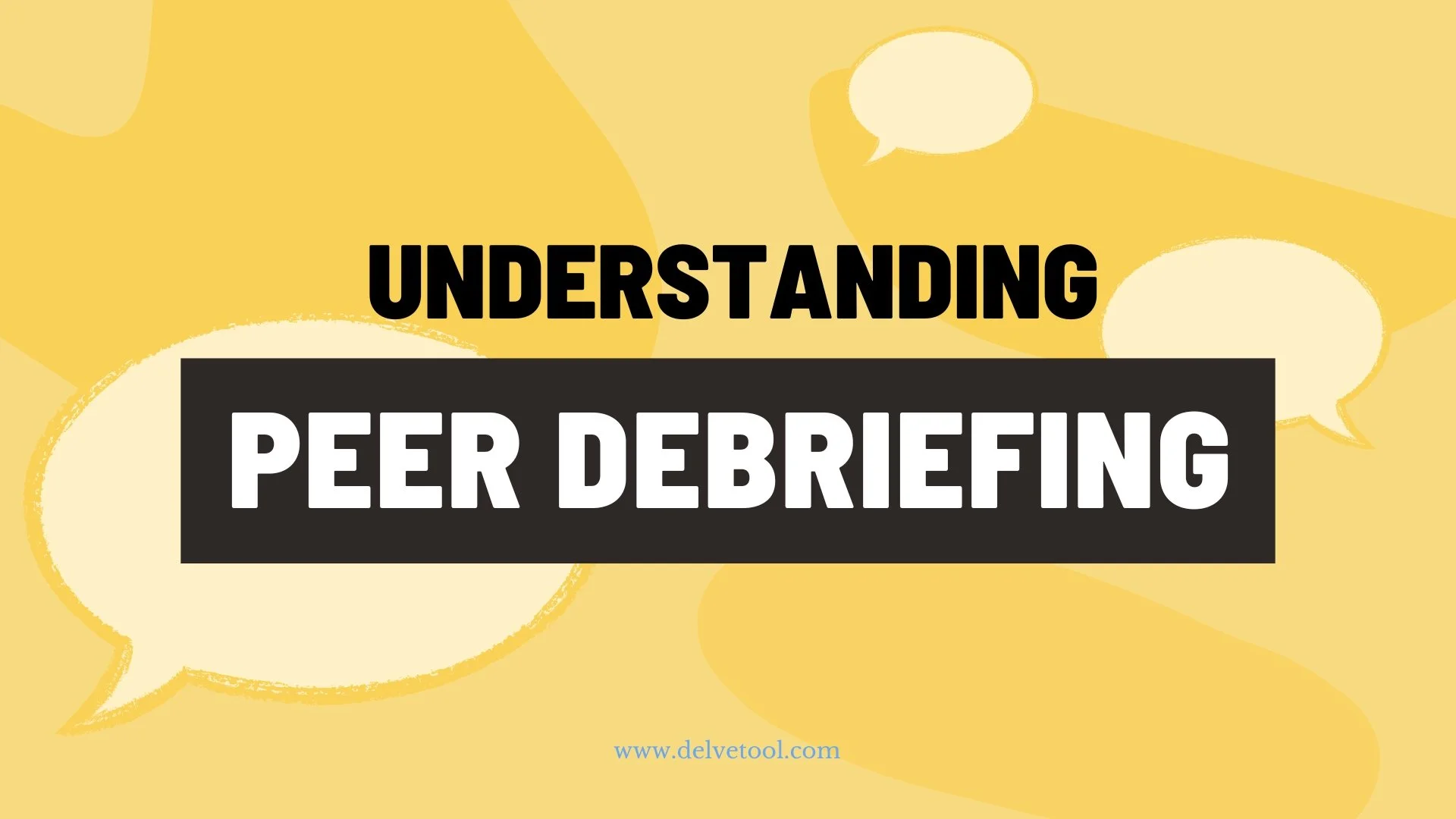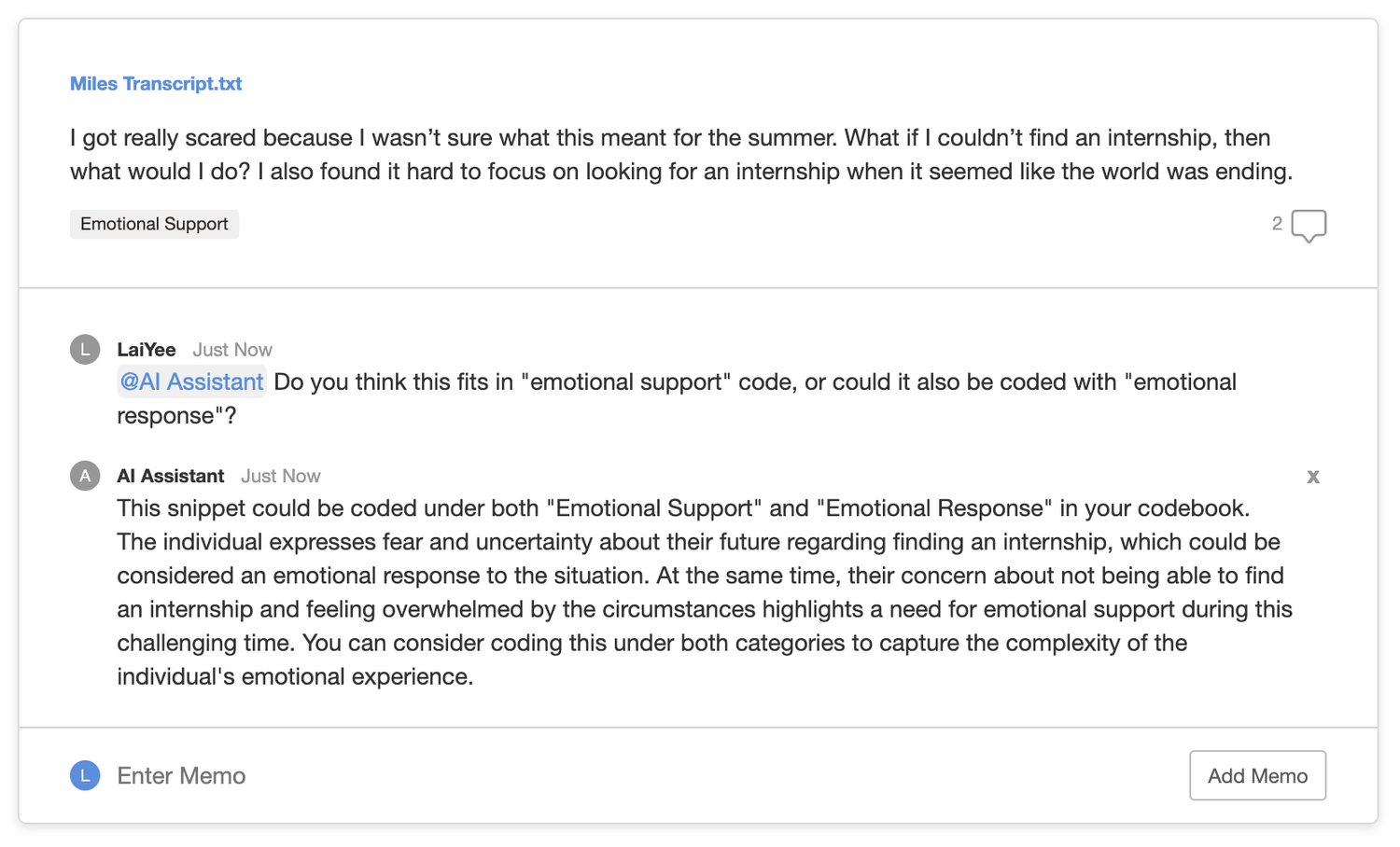What is Peer Debriefing in Qualitative Research?
What is peer debriefing?
Peer debriefing is the process of consulting with one or more peers who have no personal interest in the project to enhance the validity of your research. It involves allowing a qualified, impartial colleague to review and assess your transcripts, methodology, and findings. Qualitative researchers use this technique to probe their process in an independent, unbiased way in order to establish credibility in their research.
Why is peer debriefing essential?
Peer briefing is crucial to uncovering bias and assumptions in your research. Similar to bracketing, it is a way to take a step back and reassess the reliability of your work. Basically, it can help reframe your perspective and makes you more cognizant of your overall research approach.
Peer debriefing also gives you the opportunity to find out if your hypotheses are reasonable to a debriefer. Furthermore, it brings a new set of skills, knowledge, and values to your study.
Benefits of peer debriefing
The feedback from peer briefing helps improve research credibility and detect problems that the researcher might have missed. Through peer briefing, your colleagues can help you uncover issues like:
Vague descriptions in the study
Overemphasized or underemphasized points
Bias assumptions or perspectives made by the researcher
General errors or contradictions in the data, processes, or other parts of the study
Lastly, it helps you become more aware of your views regarding the research
Who can I choose for peer debriefing?
First of all, a peer debriefer must be someone who has no interest in the research project. Debriefers must also have training and experience in qualitative research. They should have conducted at least one project in this area and understand the nature of qualitative research methods.
You can choose two categories of people for peer debriefing: those who have inside knowledge about your research area and those who don’t. Both sets of debriefers have their advantages and drawbacks.
For example, debriefers who are familiar with your research topic can comprehend your work efficiently. You don’t need to give detailed explanations and they can also provide valuable insights. However, the drawback is that these debriefers may have the same subjective thinking as you.
On the flip side, bringing in an outsider with less intimate knowledge of the topic may help you detect things you have overlooked or taken for granted. However, they may not have enough understanding of the work to provide useful assistance or require too much time to get up to speed.
When should I start peer debriefing?
Peer debriefing can start at any stage of the research process. While some researchers prefer to introduce the debriefer in the planning session, others choose to commence peer debriefing at the later stages of their study.
How to conduct peer debriefing?
There are different approaches to peer debriefing. You can set up meetings with debriefers at specific stages of the research process or hold regular sessions throughout the entire process until the study is completed.
Another option is to have one-off meetings only when you identify a specific task. You can also get consistent feedback by sharing your analytical or theoretical memos with the debriefer throughout the process.
Some of the activities you can carry out during the peer debriefing meetings include:
Critiquing your data collection method and interview transcript
Looking for areas where you overlooked participants' perspectives
Searching for areas that need more detailed descriptions
Reviewing your coding process and memos
Reviewing and evaluating your data and analytical techniques
Peer Debriefing With Delve
Delve simplifies the peer debriefing process:
You and your debriefer can both jump into the project from anywhere – no complicated file sharing or version control headaches. If they want to leave feedback, they can drop memos right next to your codes. You can code on a Mac while they're on a PC without any compatibility drama. And there's basically no learning curve, so your peer debriefer can focus on actually reviewing your work instead of figuring out how the software works.
Everything syncs live, which means no more emailing files back and forth or trying to coordinate schedules just to compare notes. Delve auto-saves your memos, so you can quickly search and recall specific feedback without losing anything.
When your advisor or peer debriefer isn't around
There maybe times you need a second opinion at 11pm when your dissertation chair isn't answering emails. That's where Delve's AI Assistant can step in and help. Think of it as a backup peer debriefer you can bounce ideas off when your human collaborators aren't available.
You can ask it whether your code definitions make sense, have it flag patterns you might have missed, or just talk through your analytical decisions. It won't replace the nuanced feedback you get from someone who knows your field, but it gives you somewhere to test your thinking between formal peer debriefing sessions.
The AI handles specific tasks – clarifying your codebook, suggesting subcodes, checking if your analysis holds up – while you stay in control of the interpretation and meaning-making. Learn how researchers are using AI in their qualitative work.
Providing feedback after peer debriefing
The feedback from the peer debriefing process can only be helpful when it's constructive and clear. Debriefers should focus on areas that need improvements and help you to point out your strengths. Being overly critical may reduce the effectiveness of the peer debriefing process.
At the same time, debriefers shouldn't agree with every opinion of the researcher or avoid direct feedback. Asking thought-provoking questions to clarify the researcher's view makes the feedback more valuable.
Try peer-debriefing the easy way
Peer debriefing is a technique used by qualitative researchers to establish credibility. When done correctly, it helps you uncover errors, detect biases, and improve the quality of your research.
Ready to streamline your peer debriefing process? Delve's collaboration features let you work with peer debriefers in real-time, compare coding decisions side-by-side, and get feedback without the usual software headaches. Start your free 14-day trial – no credit card required.
No commitment. Cancel anytime.
Qualitative analysis doesn't have to be overwhelming
Take Delve's free online course to learn how to find themes and patterns in your qualitative data. Get started here.

Cite This Article:
Delve, Ho, L., & Limpaecher, A. (2021c, June 08). What is Peer Debriefing in Qualitative Research? https://delvetool.com/blog/peerdebriefing





